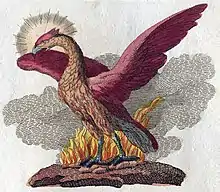phoenix
English

Phoenix

Stone bas-relief with phoenixes, Eastern Han dynasty, Tokyo National Museum

Phoenix (Greek coin)
Etymology
From Old English and Old French fenix, from Medieval Latin phenix, from Latin phoenīx, from Ancient Greek φοῖνιξ (phoînix), from Egyptian bnw (boinu, “grey heron”). The grey heron was venerated at Heliopolis and associated in Egypt with the cyclical renewal of life because the bird rises in flight at dawn and migrates back every year in the flood season to inhabit the Nile waters.[1]
Pronunciation
- enPR: fē'nĭks, IPA(key): /ˈfiːnɪks/
- Rhymes: -iːnɪks
Noun
phoenix (plural phoenix or phoenixes or phoenices)
- (mythology) A mythological bird, said to be the only one of its kind, which lives for 500 years and then dies by burning to ashes on a pyre of its own making, ignited by the sun. It then arises anew from the ashes.
- 1609, William Shakespeare, Sonnet 19:
- burn the long-lived phoenix in her blood
- 1609, William Shakespeare, Sonnet 19:
- (figuratively) Anything that is reborn after apparently being destroyed. Usually used as a simile.
- Astronomers believe planets might form in this dead star's disk, like the mythical Phoenix rising up out of the ashes.
- (Chinese mythology) A mythological Chinese chimerical bird whose physical body symbolizes the six celestial bodies.
- (historical) A Greek silver coin used briefly from 1828 to 1832, divided into 100 lepta.
Translations
mythological bird
|
|
anything reborn after apparently being destroyed
- The translations below need to be checked and inserted above into the appropriate translation tables, removing any numbers. Numbers do not necessarily match those in definitions. See instructions at Wiktionary:Entry layout#Translations.
References
- Maria Carmela Betrò, Hieroglyphics: The Writings of Ancient Egypt (Abbeville, 1996), 108.
Latin
Pronunciation
- (Classical) IPA(key): /ˈpʰoe̯.niːks/
- (Ecclesiastical) IPA(key): /ˈfɛ.niks/, [ˈfɛː.niks]
Inflection
Third declension i-stem.
| Case | Singular | Plural |
|---|---|---|
| Nominative | phoenīx | phoenīcēs |
| Genitive | phoenīcis | phoenīcium |
| Dative | phoenīcī | phoenīcibus |
| Accusative | phoenīcem | phoenīcēs |
| Ablative | phoenīce | phoenīcibus |
| Vocative | phoenīx | phoenīcēs |
Inflection
Third declension.
| Case | Singular | Plural |
|---|---|---|
| Nominative | phoenīx | phoenīcēs |
| Genitive | phoenīcis | phoenīcum |
| Dative | phoenīcī | phoenīcibus |
| Accusative | phoenīcem | phoenīcēs |
| Ablative | phoenīce | phoenīcibus |
| Vocative | phoenīx | phoenīcēs |
Inflection
Third declension, non-i-stem (genitive plural in -um).
| Number | Singular | Plural | |||
|---|---|---|---|---|---|
| Case / Gender | Masc./Fem. | Neuter | Masc./Fem. | Neuter | |
| Nominative | phoenīx | phoenīx | phoenīcēs | phoenīca | |
| Genitive | phoenīcis | phoenīcis | phoenīcum | phoenīcum | |
| Dative | phoenīcī | phoenīcī | phoenīcibus | phoenīcibus | |
| Accusative | phoenīcem | phoenīx | phoenīcēs | phoenīca | |
| Ablative | phoenīce | phoenīce | phoenīcibus | phoenīcibus | |
| Vocative | phoenīx | phoenīx | phoenīcēs | phoenīca | |
Synonyms
- (Phoenician): phoenīcius
References
(phoenix):
- phoenix, īcis, m. in Charlton T. Lewis and Charles Short (1879) A Latin Dictionary, Oxford: Clarendon Press
- phoenīx īcis (acc. īca, O.), m in Charlton T. Lewis (1891) An Elementary Latin Dictionary, New York: Harper & Brothers
- phoenix in Harry Thurston Peck, editor (1898) Harper's Dictionary of Classical Antiquities, New York: Harper & Brothers
(Phoenician):
- Phoenix, īcis in Charlton T. Lewis and Charles Short (1879) A Latin Dictionary, Oxford: Clarendon Press
- Phoenīces, um, m. and sing. Phoenix s.v. Phoenīcē, ēs, f. in Charlton T. Lewis and Charles Short (1879) A Latin Dictionary, Oxford: Clarendon Press
This article is issued from Wiktionary. The text is licensed under Creative Commons - Attribution - Sharealike. Additional terms may apply for the media files.